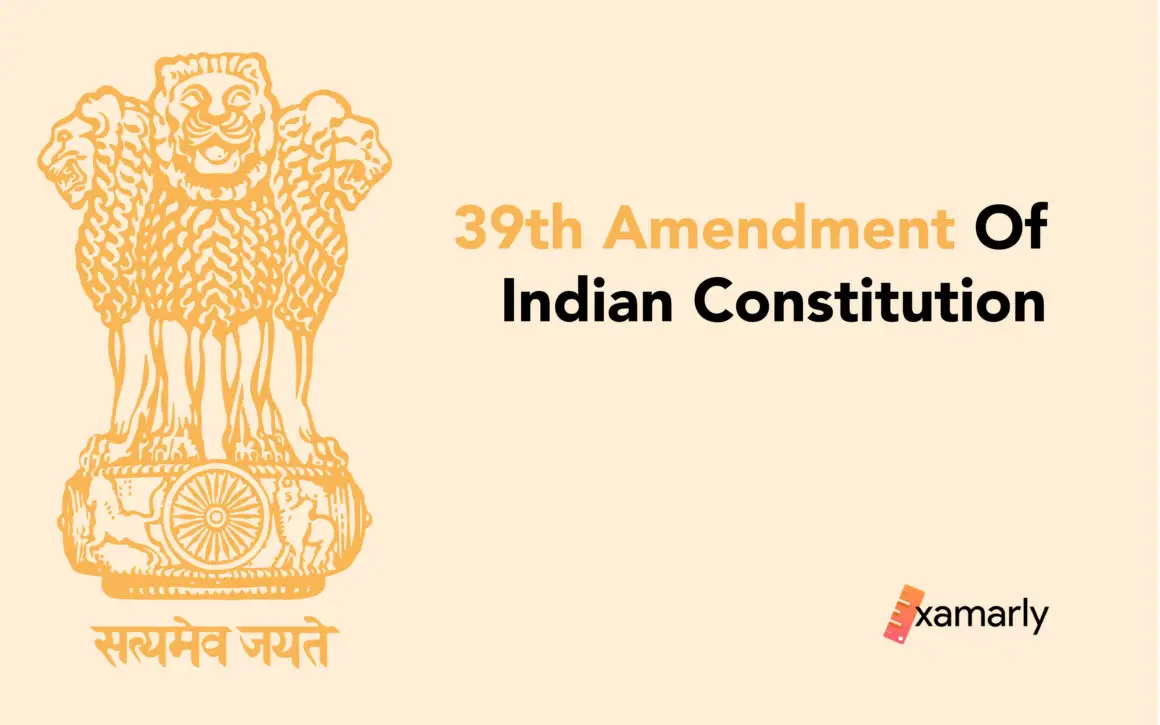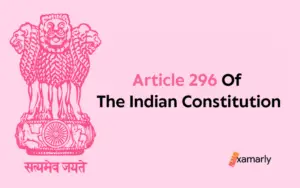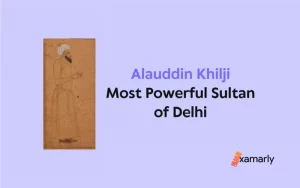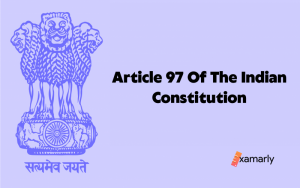The 39th Amendment of Indian Constitution is officially known as The Constitution (Thirty-Ninth Amendment) Act, 1975. The election of the Prime Minister, the President, the Vice President, and the Speaker of the Lok Sabha was no longer subject to judicial review by the Thirty-ninth Amendment to the Indian Constitution.
Read this article further to learn more about the changes done by the 39th amendment of Indian Constitution. This will be worth reading for you if you are preparing for a competitive examination like UPSC.
What Is The 39th Amendment Of Indian Constitution?
On10 August 1975, Thirty-Ninthamendment came into effect. 39th Amendment of Indian Constitution was enacted in the twenty-sixth year of the Republic of India. The Amendment was intended to overturn the Allahabad High Court ruling that declared Prime Minister Indira Gandhi’s election to the Parliament unconstitutional. The Prime Minister’s position is subject to judicial scrutiny according to an amendment. It was passed in response to the Allahabad High Court’s decision invalidating PM Indira Gandhi’s election to the Lok Sabha on Raj Narain’s appeal.
On August 7, 1975, the amendment was proposed and approved by the Lok Sabha. Later, on August 8, 1975, it was reintroduced and approved in the Rajya Sabha. The change was approved by as many as 17 State Assemblies that were called on Saturday, August 9. On Sunday, August 10, President Fakhruddin Ali Ahmad granted his approval, and the civil officials published a gazette notice on the same day. The Supreme Court of India’s scheduled hearing on the petition contesting Prime Minister Indira Gandhi’s election on August 11, 1975, became infructuous as a result of this modification to the Indian Constitution.
Main Points
- This constitutional amendment modifies articles 71, 329, and schedule 9 of the Indian constitution. In addition, article 329A was also included.
- The Lok Sabha approved the Bill on August 7. It was later given presidential approval on August 9, 1975.
- The election of the President and Vice President, as well as the election of the Prime Minister and Speaker of Parliament, are not subject to legal challenge under the Act.
Salient Features And Facts
| When was 39th amendment of Indian Constitution Introduced? | In the Lok Sabha on 7 August 1975 |
| When was the 39th amendment of Indian Constitution passed? | passed in the Rajya Sabha on 8 August 1975. |
| Which articles were amended? | Articles 71 and 329. |
| Which articles were inserted? | Article 329A. |
| Which Schedules were amended by the 39th amendment of Indian Constitution | Schedule 9 |
Object And Reason
- The Supreme Court will rule on disagreements relating to the election of the President or Vice President, according to Article 71 of the Constitution. The same clause stipulates that parliamentary legislation must govern all election-related issues. The Representation of the People Act of 1951 contains provisions that govern topics connected to the election of the Prime Minister and the Speaker. According to this Act, the High Court has the authority to hear an election petition brought against one of them.
- The Speaker of the House, the Prime Minister, the President, and the Vice-President are examples of senior authorities. When acting in the course of his duties as President, the President is not subject to legal accountability in a court of law. For the same reason, issues pertaining to his election shouldn’t be brought before a court of law. Instead, they should be submitted to a forum. The vice president, prime minister, and speaker in the office are also subject to the same justification. Consequently, it is proposed to state that issues involving the election of the President and Vice-President shall be resolved by a forum as may be specified by a parliamentary statute.
- The election of a person holding the position of Prime Minister or Speaker to either House of Parliament or, as the case may be, to the House of the People is proposed to be subject to a similar clause. Additionally, it is suggested that any pending legal actions related to such an election be declared void. The Bill also states that no court shall challenge the parliamentary law establishing a new venue for the trial of election disputes involving the holders of the high posts previously listed.
- When progressive legislation created in the public interest was proven to be in jeopardy by litigation in the past, recourse was available to the Ninth Schedule. Again using this tool is now mandatory. The legislation was passed between 1971 and 1973 to nationalize coal mines and coking coal. The purpose was to preserve these resources for the benefit of the steel industry. On the grounds that they are unconstitutional, these laws have been challenged in court. The same is true for failing textile undertakings that were nationalized in 1974. The smuggling of goods and diversion of foreign exchange affect the national economy. The Parliament has passed legislation to prevent this. This legislation has once again been challenged in the Supreme Court and in High Courts. It is advised to include these and other noteworthy and distinctive laws in the ninth schedule. The justification for this is that It is considered necessary to provide them constitutional protection under article 31B. The Ninth Schedule already contains a number of State laws on land reform and agricultural land holdings. The constitutional provisions of article 31B must also be protected in relation to some changes made to these laws.
- The Bill seeks to give effect to the above objects.
Important Provisions
Substitution of new article for article 71– The following article shall be replaced for Article 71 of the Constitution, namely:-
Matters concerning or involving the election of the President or Vice President. (1)Subject to the provisions of this Constitution, Parliament may by law regulate any subject pertaining to or associated with the election of a President or Vice-President, including the grounds on which such an election may be contested:
With the exception that the election of a person as President or Vice-President shall not be challenged on the grounds that there may be a vacancy among the members of the electoral college who will elect him, regardless of the cause.
(2) All questions and disagreements relating to the choice of a President or Vice President must be investigated. Additionally, decisions must be made by the appropriate authority or organization and in accordance with any applicable laws mentioned in clause (1).
(3)The legality of any such law as is mentioned in clause (1). In addition, no court may review a judgment made by any authority or entity under such statute.
(4)If a person’s election to the office of President or Vice President is declared invalid by a statute mentioned in clause (1). Acts that were completed by him in the course of carrying out his responsibilities as President or Vice President, as the case may be, on or before the date of such declaration, shall not be deemed invalid as a result of such declaration.
Amendment of article 329.-In place of the phrase “Notwithstanding anything in this Constitution,” the words, numbers, and letter “Notwithstanding anything in this Constitution but subject to the provisions of article 329A” shall exist in article 329 of the Constitution.
Insertion of new article 329A- After Article 329 in Part XV of the Constitution, the following article shall be added:
Special provisions regarding Speaker and Prime Minister elections to Parliament. (1)No election shall be made, subject to the provisions of Chapter II of Part V [other than clause (1), subclause (e) of Article 102].
(a)a person who was the prime minister at the time of the election or who was named prime minister after the election to either House of Parliament;
(b)a person who was the Speaker of the House of People at the time of the election or who was chosen to be the Speaker of the House following the election,
shall not be called into question, unless in front of the appropriate authority or body and in accordance with the provisions of any law passed by Parliament, which law may also specify the grounds for calling the election into question.
(2)No court may challenge the legality of any such law as is mentioned in paragraph (1) or the judgment of any authority or body created according to such law.
(3) Election petitions referred to in clause (b) of article 329 regarding a person’s election to either the House of Parliament or, as the case may be, the House of the People that are pending in respect to that person’s appointment as Prime Minister or, as the case may be, selection to the office of Speaker of the House of the People, shall cease upon such appointment as Prime Minister or, as the case may be, upon such person’s selection to the office of Speaker (1).
(4) No law passed by Parliament prior to the effective date of the Constitution insofar as it relates to election petitions and matters connected therewith, shall apply to or be deemed to have applied to the election of any person to either House of Parliament as referenced in clause (1).
Moreover, such political race will not be considered to be void or ever to have become void on any ground on which such political race could be proclaimed to be void or has, before such beginning, been pronounced to be void under any such regulation and despite any request made by any court, before such beginning, announcing such political race to be void, such political decision will keep on being legitimate in all regards and any such request and any finding on which such request is based will be and will be considered consistently to have been void and of no impact.
(5)Before the 39th amendment of Indian Constitution took effect, any appeal or cross-appeal against any such order of any court as is referenced in clause (4) pending before the Supreme Court will be resolved in accordance with the provision of clause (4).
(6)No matter what else is in this Constitution, the terms of this article will apply.
Amendment of the Ninth Schedule- The following entries should be added to the Constitution’s Ninth Schedule after entry 86 and before the Explanation:-
- “87. The Representation of the People Act, 1951 (Central Act 43 of 1951), the Representation of the People (Amendment) Act, 1974 (Central Act 58 of 1974), and the Election Laws (Amendment) Act, 1975 (Central Act 40 of 1975).
- 88. The Industries (Development and Regulation) Act, 1951 (Central Act 65 of 1951).
- 89. The Requisitioning and Acquisition of Immovable Property Act, 1952 (Central Act 30 of 1952).
- 90. The Mines and Minerals (Regulation and Development) Act, 1957 (Central Act 67 of 1957).
- 91. The Monopolies and Restrictive Trade Practices Act, 1969 (Central Act 54 of 1969).
- 92. The Maintenance of Internal Security Act, 1971 (Central Act 26 of 1971).
- 93. The Coking Coal Mines (Emergency Provisions) Act, 1971 (Central Act 64 of 1971).
- 94. The Coking Coal Mines (Nationalisation) Act, 1972 (Central Act 36 of 1972).
- 95. The General Insurance Business (Nationalisation) Act, 1972 (Central Act 57 of 1972).
- 96. The Indian Copper Corporation (Acquisition of Undertaking) Act, 1972 (Central Act 58 of 1972).
- 97. The Sick Textile Undertakings (Taking Over of Management) Act, 1972 (Central Act 72 of 1972).
- 98. The Coal Mines (Taking Over of Management) Act, 1973 (Central Act 15 of 1973).
- 99. The Coal Mines (Nationalisation) Act, 1973 (Central Act 26 of 1973).
- 100. The Foreign Exchange Regulation Act, 1973 (Central Act 46 of 1973).
- 101. The Alcock Ashdown Company Limited (Acquisition of Undertakings) Act, 1973 (Central Act 56 of 1973).
- 102. The Coal Mines (Conservation and Development) Act, 1974 (Central Act 28 of 1974).
- 103. The Additional Emoluments (Compulsory Deposit) Act, 1974 (Central Act 37 of 1974).
- 104. The Conservation of Foreign Exchange and Prevention of Smuggling Activities Act, 1974 (Central Act 52 of 1974).
- 105. The Sick Textile Undertakings (Nationalisation) Act, 1974 (Central Act 57 of 1974).
- 106. The Maharashtra Agricultural Lands (Ceiling on Holdings) (Amendment) Act, 1964 (Maharashtra Act XVI of 1965).
- 107. The Maharashtra Agricultural Lands (Ceiling on Holdings) (Amendment) Act, 1965 (Maharashtra Act XXXII of 1965.
- 108. The Maharashtra Agricultural Lands (Ceiling on Holdings) (Amendment) Act, 1968 (Maharashtra Act XVI of 1968).
- 109. The Maharashtra Agricultural Lands (Ceiling on Holdings) (Second Amendment) Act, 1968 (Maharashtra Act XXXIII of 1968).
- 110. The Maharashtra Agricultural Lands (Ceiling on Holdings) (Amendment) Act, 1969 (Maharashtra Act XXXVII of 1969).
- 111. The Maharashtra Agricultural Lands (Ceiling on Holdings) (Second Amendment) Act, 1969 (Maharashtra Act XXXVIII of 1969).
- 112. The Maharashtra Agricultural Lands (Ceiling on Holdings) (Amendment) Act, 1970 (Maharashtra Act XXVII of 1970).
- 113. The Maharashtra Agricultural Lands (Ceiling on Holdings) (Amendment) Act, 1972 (Maharashtra Act XIII of 1972).
- 114. The Maharashtra Agricultural Lands (Ceiling on Holdings) (Amendment) Act, 1973 (Maharashtra Act L of 1973).
- 115. The Orissa Land Reforms (Amendment) Act, 1965 (Orissa Act 13 of 1965).
- 116. The Orissa Land Reforms (Amendment) Act, 1966 (Orissa Act 8 of 1967).
- 117. The Orissa Land Reforms (Amendment) Act, 1967 (Orissa Act 13 of 1967).
- 118. The Orissa Land Reforms (Amendment) Act, 1969 (Orissa Act 13 of 1969).
- 119. The Orissa Land Reforms (Amendment) Act, 1970 (Orissa Act 18 of 1970).
- 120. The Uttar Pradesh Imposition of Ceiling on Land Holdings (Amendment) Act, 1972 (Uttar Pradesh Act 18 of 1973).
- 121. The Uttar Pradesh Imposition of Ceiling on Land Holdings (Amendment) Act, 1974 (Uttar Pradesh Act 2 of 1975).
- 122. The Tripura Land Revenue and Land Reforms (Third Amendment Act, 1975 (Tripura Act 3 of 1975).
- 123. The Dadra and Nagar Haveli Land Reforms Regulation, 1971 (3 of 1971).
- 124. The Dadra and Nagar Haveli Land Reforms (Amendment) Regulation, 1973 (5 of 1973).”.
Conclusion
The 39th Amendment of Indian Constitution went into effect on 10 August 1975. This constitutional amendment modifies articles 71, 329, and schedule 9 of the Indian constitution.
This Act was passed in response to the Allahabad High Court’s decision invalidating PM Indira Gandhi’s election to the Lok Sabha on Raj Narain’s petition. This exempted the president, vice president, prime minister, and speaker from the jurisdiction of the courts. They are to be decided by whichever authority the Parliament chooses.






